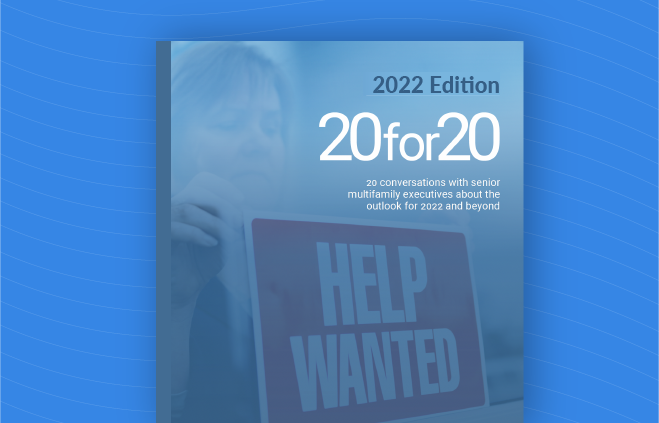2022 Multifamily Outlook: 20 Conversations With Senior Executives
LeaseLock is proud to serve as a sponsor for the 2022 edition of 20 fo 20, the industry’s leading executive survey on multifamily operations and technology. This year’s report provides a unique executive viewpoint on the current and future state of leasing operations and best-of-breed vs. bundled tech. Featuring 20 conversations with senior multifamily executives, the survey also includes perspectives from Domuso, LeaseLock, AppFolio, Latch, and Anyone Home on trending technology priorities.
As with previous editions, the survey invites operators to recount the previous year and speculate on the upcoming year. While COVID has dominated conversations the past two years, this year’s edition focuses on how companies are exiting the pandemic, with new strategies and technology solutions to address talent management, rent payments, security deposits, AI agents, smart buildings, and centralized leasing.
Read LeaseLock’s sponsored viewpoint below, or download the full 20 for 20 white paper here.
How to Replace Deposits. For Good.
It seems that we are operating in a time of unprecedented innovation in the arena of resident financial services. An impressive tide of innovation is improving resident experiences, increasing affordability and streamlining financial transactions. And the streamlining part is more important than ever, as staff shortages continue to heap stress on property teams.
With hiring conditions so challenging, the problems that most operators are trying to solve are the ones that reduce site team workload. Even when operators identify potential financial opportunities, few will consider exploiting them if they entail additional work.
The good news is that there is a win-win to be had. A growing segment of the multifamily industry has taken a step that creates more affordable move-ins for residents while boosting financial performance for properties. Companies that completely remove security deposits from their communities can reduce administrative overhead with no additional effort from site teams. It may seem too good to be true until we consider the impact security deposits have had on our industry since time immemorial.
Three Reasons Why Deposits Must Go
First, deposits account for most of a community’s bad debt—even in properties that don’t have a bad debt problem. Screening helps properties to mitigate credit risk, but even the strictest credit checks cannot cover lost rent and damage when a resident moves out. Companies collect deposits for this reason, but when a resident leaves with unpaid rent or damage amounting to a dollar value higher than the security deposit, the balance is bad debt.
Second, deposits are becoming increasingly risky and burdensome as more and more legislations apply renter-friendly deposit laws. As one client shared: “We were getting lawsuits every week over a few hundred dollars.” In states where “Renter’s Choice” laws stipulate that operators must offer an alternative to a security product, many operators reach for “deposit alternative” products. But few realize that those products are surety bonds, meaning that the bond provider retains the right to collect on payments from the former resident.
Finally, deposits negatively impact customer experience, both on move-in and move-out. They place a financial hurdle in the leasing process, creating sticker shock in markets where competitors no longer require deposits. And on move-out, nothing guarantees negative online reviews quite like a dispute over a security deposit.
Replacement > Alternative
The trick is to think about the problem the right way. To cut bad debt, minimize risk and workload, and improve customer experience, operators have to seek a complete replacement for deposits, not simply a deposit alternative.
Security deposits are designed as a crude form of insurance against property damage and rent loss. In 2022, we should be solving insurance problems with insurance solutions. That means operators purchasing the level of coverage that they need at a competitive price. They can recoup the cost of the insurance by offering residents a monthly deposit waiver charge.
When offered the choice between a monthly waiver fee or a security deposit, few prospects opt to pay the deposit. With the vast majority of leases insured, deposits become, at worst, a marginal feature of property management. And in an environment where property operations are likely to be stressed for the foreseeable future, deposits are one problem that the industry needs to get off its desk for good.
For access to the full white paper, download your free copy:
[cta_button link=”https://info.leaselock.com/20-for-20″ text=”Get Free Copy”]




